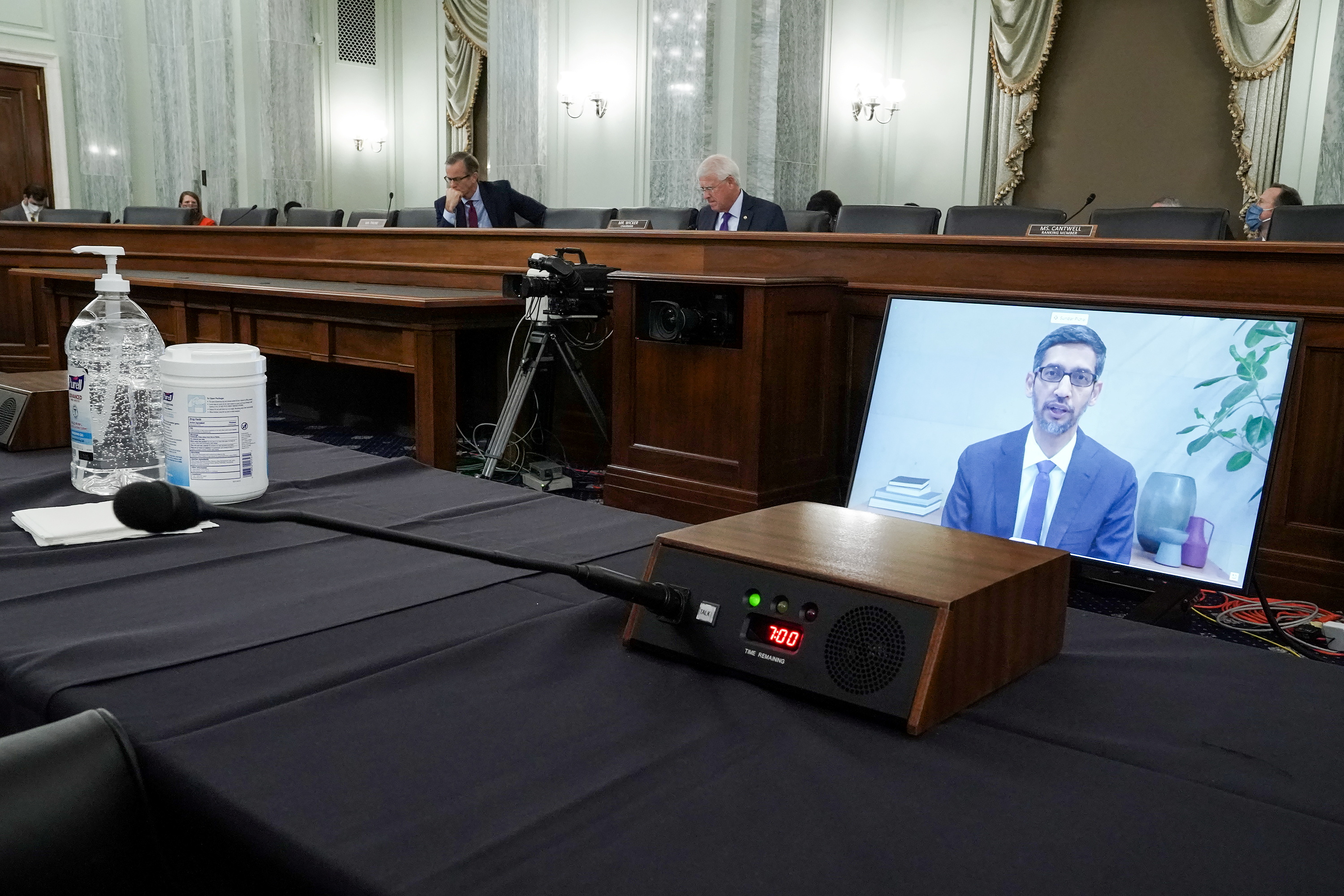Section 230: Congress Seeks Testimony, Ignores It
By EJ Haselden, October 30, 2020
It’s a timeless trope from the era of afterschool specials: misbehaving children stand before Mom and Dad’s kitchen-table duumvirate to answer for their schoolyard shenanigans, but the pretense of discipline soon wears through and the scene devolves into a nasty argument between the grownups. The kids’ real punishment is that they are made pawns and captive audience to a painful display of parental dysfunction. So unfolded this week’s Senate hearing on social media regulation, rhetorically titled “Does Section 230’s Sweeping Immunity Enable Big Tech Bad Behavior?”

Section 230 (47 U.S.C. § 230) is a part of the 1996 Communications Decency Act, and it is perhaps best known for shielding social media companies (among others) from liability for content that their users post:
“No provider or user of an interactive computer service shall be treated as the publisher or speaker of any information provided by another information content provider.”
The titular “bad behavior” and “sweeping immunity” that prompted this hearing, however, relate to another, lesser-known protection granted by Section 230, which shields platforms when they choose to filter, fact-check, or otherwise annotate content that they consider harmful and/or inaccurate:
“No provider or user of an interactive computer service shall be held liable on account of any action voluntarily taken in good faith to restrict access to or availability of material that the provider or user considers to be obscene, lewd, lascivious, filthy, excessively violent, harassing, or otherwise objectionable, whether or not such material is constitutionally protected”
The nominal debate here surrounds the “otherwise objectionable” material in that description. Social media companies have chosen to interpret it as any content of questionable origin or veracity that could result in public harm (most recently regarding health advisories, voter suppression, and influence campaigns orchestrated by foreign intelligence services). Their caution stems from lessons learned in the rapid spread of disinformation leading up to the 2016 election, as well as a once-in-a-century pandemic that has seen deadly irresponsible claims espoused by supposed authority figures. Republican lawmakers claim that this content moderation has disproportionately muted conservative voices on social media. Democratic lawmakers, meanwhile, argue that these companies not only have the right, but the responsibility, to assess content based on its potential consequences and without regard for its ideological bent. It should be noted that multiple independent studies and a Facebook internal audit failed to find the alleged anti-conservative bias, but the fact that right-leaning engagement actually dwarfs that of center and left-leaning sources means that flagging only a small fraction of it still provides ample anecdotal evidence of prejudice (which is obviously enough to prompt Congressional hearings).
The administration has called for an outright repeal of Section 230, despite the fact that this would almost certainly lead to more content restrictions as companies adapt to the increased threat of liability. The consensus on Capitol Hill and in Silicon Valley therefore appears to be some amount of targeted Section 230 reform, while keeping the basic framework intact.

Which brings us back to this week’s hearing (or spectacle, or charade, or sham, depending on whom you ask). The Senate Committee on Commerce, Science, and Transportation subpoenaed the CEOs of Google, Twitter, and Facebook, respectively, to testify on behalf of Social Media. Most commentators agree that the face time with Tech Actual was not spent productively. As with those quarrelling parents, it was never really about the kids.
Republicans’ line of soi-disant questioning focused almost entirely on what they consider censorship of conservatives (69 of 81 questions, per the New York Times), as they demanded examples of the same (loosely defined) censorship directed at liberal outlets. Senator Ron Johnson asked the witnesses about the ideological makeup of their respective workforces—rhetorically, because it would be illegal for them to maintain that sort of record—in an effort to prove anti-conservative bias by virtue of microcultural majority (which almost sounded like an argument for some variant of affirmative action).
Democrats, for their part, focused most of their attention on the legitimacy and impact of the hearing itself, expressing concern that it could serve to intimidate social media companies into relaxing moderation policies at a time when the nation is perhaps most vulnerable to manipulative media. The bulk of their more on-topic questioning concerned dis- and misinformation and what actions the companies were taking to combat it ahead of the election. Still, not that much about Section 230 reform.
In keeping with the scripted, postured non-discussion, the most meaningful witness testimony came in the form of prepared opening statements. In those, Pichai reasserted Google’s anti-bias philosophy and cautioned against reactionary changes to Section 230, Dorsey promoted increased transparency and user inclusion in Twitter’s decision-making processes, and Zuckerberg praised Section 230 while inviting a stricter and more explicit rewrite of its provisions (for which Facebook would gladly provide input). Their full statements are available on the committee’s hearing website.
The timing and tenor of this eleventh-hour pre-election partisan screed exchange never inspired much hope for substantive debate, but even so, there was a jarring lack of effort to better understand the pressing and complex problems that Section 230 is still, at this moment, expected to resolve. The reason this matters, the reason it’s so alarming that neither side was terribly interested in the companies’ offers of greater transparency—something we’d consider a win for democracy in saner times—is that our government has abdicated its responsibility of oversight on this topic except in cases where the threat of enforcement can be used as a political weapon.
In the end, it’s probably fitting that Congress used a social media hearing as a platform to amplify and disseminate entrenched views that they had no intention of rethinking.

Photo credits:
